KJU Visits Cemeteries and Attends Photo Session with War Veterans
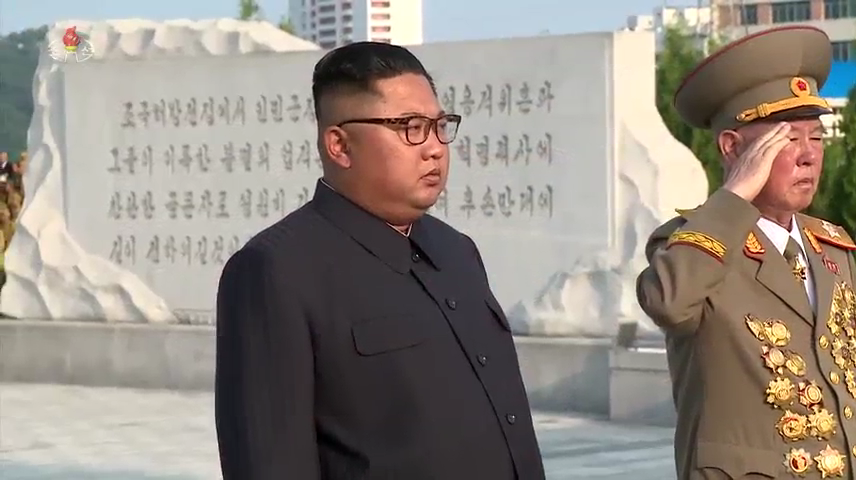
Kim Jong Un and VMar Ri Myong Su at the Fatherland Liberation War Cemetery on July 27, 2018 (Photo: KCTV).
KJU’s last observed appearance was his visit to Wo’nsan Disabled Soldiers’ Bag Factory with Ri Sol Ju
Kim Jong Un (Kim Cho’ng-u’n) conducted three public activities on July 27 (Thursday) to commemorate the 65th anniversary of the end of active hostilities of the Fatherland Liberation War (Korean War).
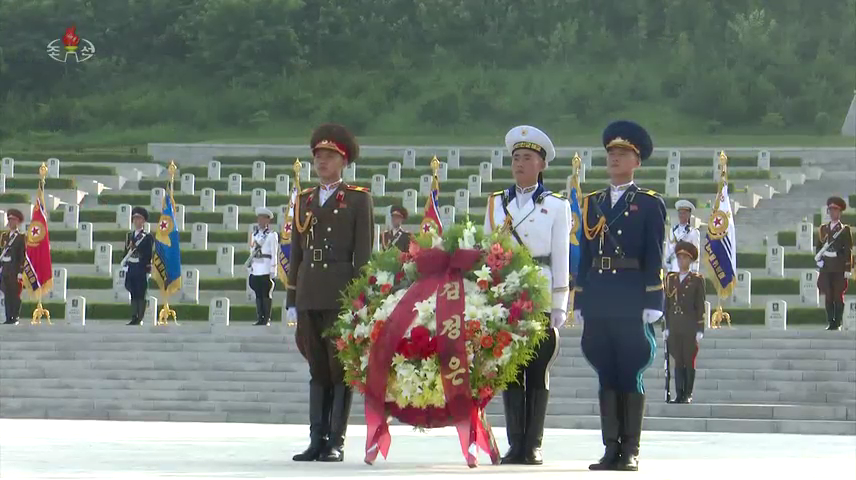
A KPA Honor Guard stand near a floral wreath Kim Jong Un delivered to the cemetery (Photo: KCTV).
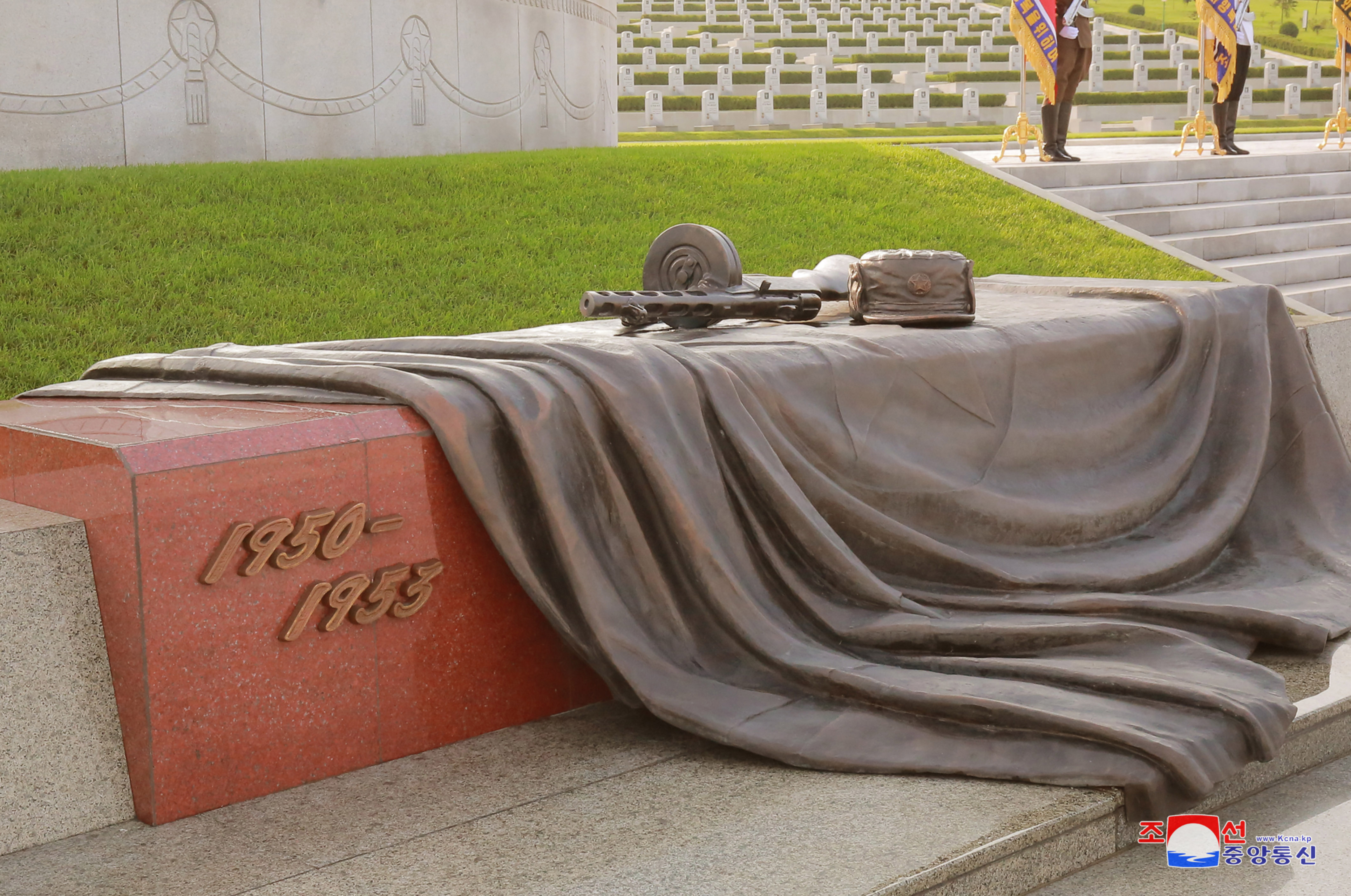
View of the monument to fallen soldiers of the KPA at the Fatherland Liberation War Cemetery in Pyongyang on July 27, 2018 (Photo: KCNA)
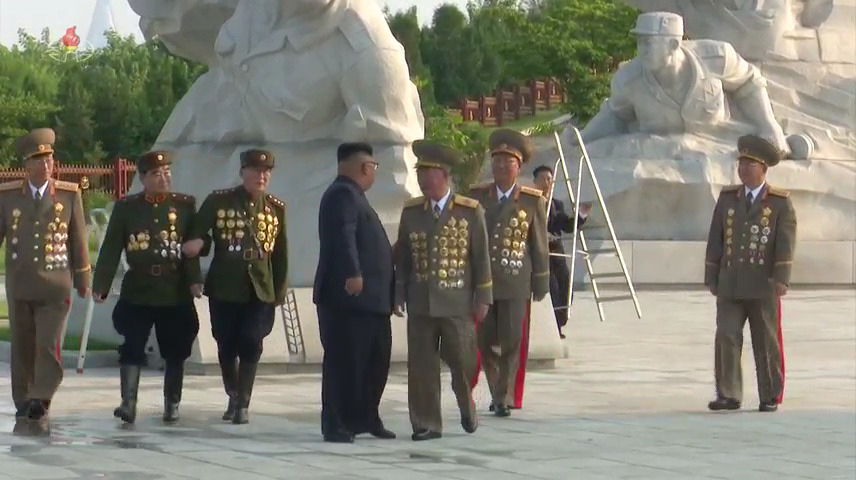
Kim Jong Un talks with VMar Ri Myong Su prior to the wreath laying ceremony on July 27, 2018. At the left WPK Vice Chairman Thae Jong Su assists SPA Presidium Vice President Yang Hyong Sop (Photo: KCTV).
He visited the Fatherland Liberation War Martyrs’ Cemetery in Pyongyang and “paid homage to the martyrs of the People’s Army.” Visiting the cemetery with him were Korean People’s Army (KPA) General Political Bureau Director Gen. Kim Su Gil (Kim Su-kil), Chief of the KPA General Staff Department Gen. Ri Yong Gil (Ri Yo’ng-kil), Minister of the People’s Armed Forces Gen. No Kwang Chol (No Kwang-ch’o’l), Supreme People’s Assembly Presidium Vice President and war veteran Yang Hyong Sop (Yang Hyo’ng-sop), Personal Secretariat adviser and war veteran VMar Ri Myong Su (Ri Myo’ng-su) and Workers’ Party of Korea (WPK) Vice Chairman and WPK Munitions Industry Department Director Thae Jong Su (T’ae Cho’ng-su).
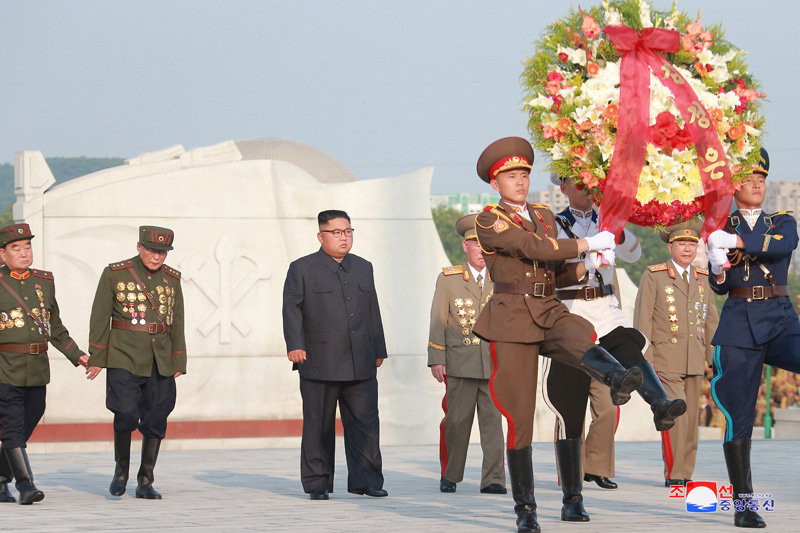
A floral wreath from Kim Jong Un is delivered at the Fatherland Liberation War Cemetery in Pyongyang on July 27, 2018 (Photo: KCNA) (Rodong Sinmun)
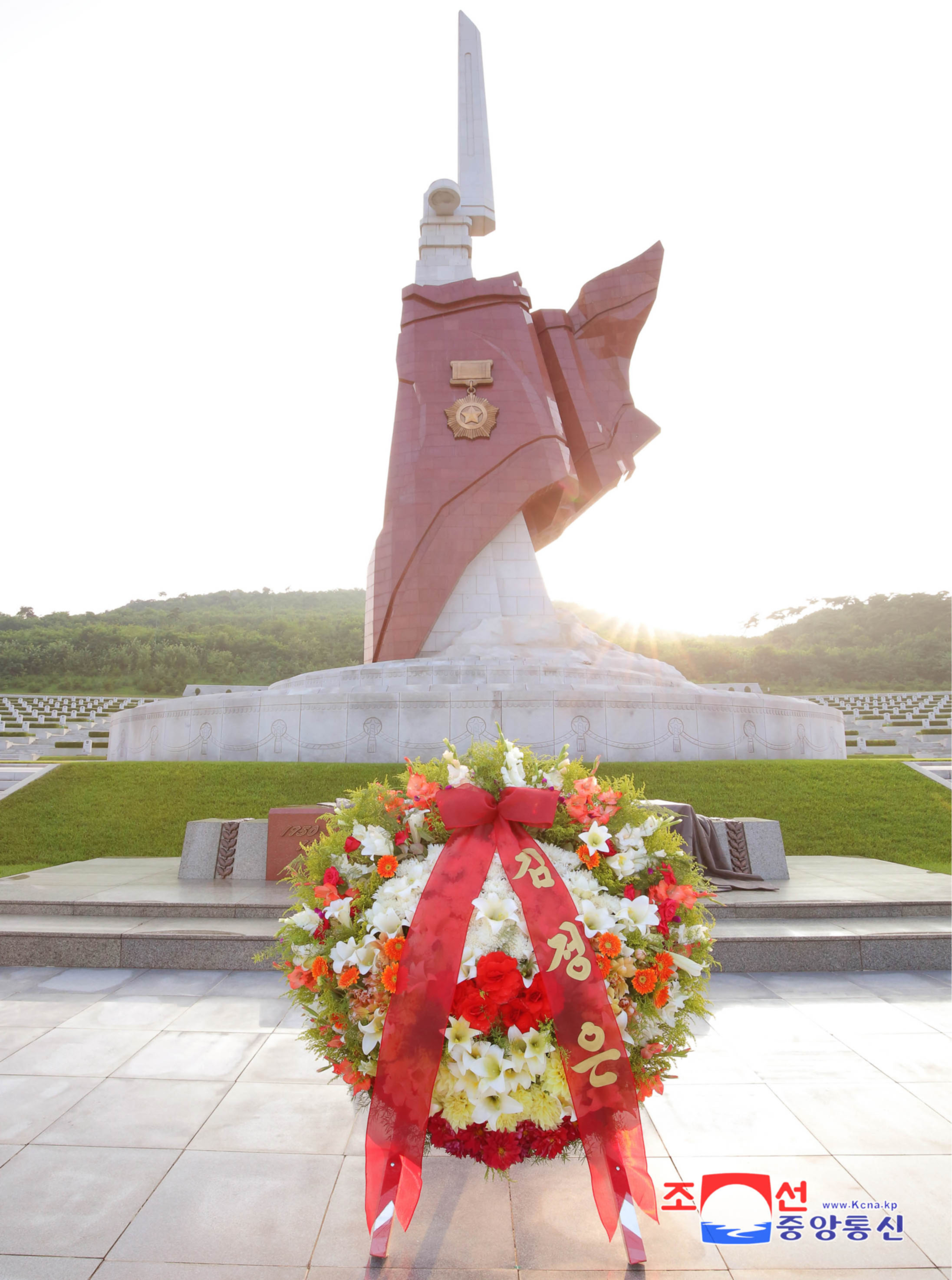
Kim Jong Un’s floral wreath in front of the monument at the Fatherland Liberation War Cemetery on July 27, 2018 (Photo: KCNA).
The Patriotic Song played along with solemn music marking a wreath-laying ceremony as Kim Jong Un’s floral wreath was placed at the monument. Kim Jong Un “observed a moment’s silence in memory of the martyrs who laid down their precious lives for the sacred war for the Party, the revolution, the country and the people.”

Kim Jong Un pays his respects at the Fatherland Liberation War Cemetery in Pyongyang on July 27, 2018 (Photo: KCNA).
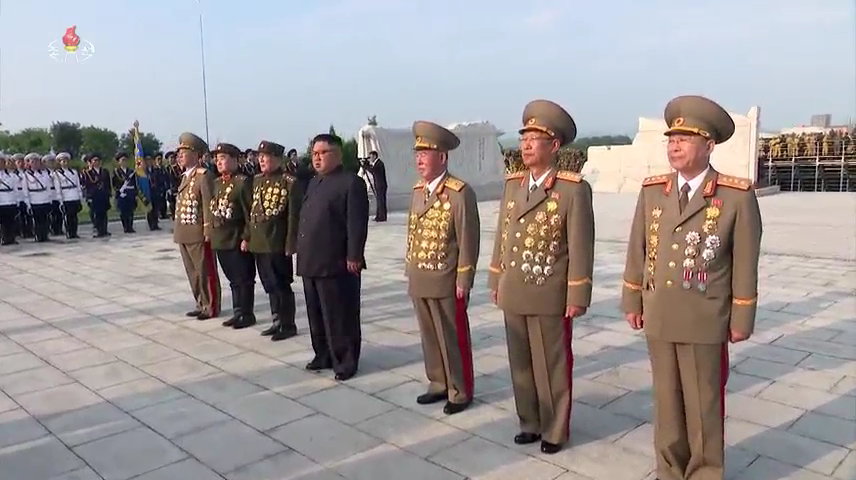
Kim Jong Un at the Fatherland Liberation War Cemetery on July 27, 2018. Also in attendance are Gen No Kwang Chol, Thae Jong Su, Yang Hyong Sop, VMar Ri Myong Su, Gen. Kim Su Gil and Gen Ri Yong Gil (Photo: KCTV)
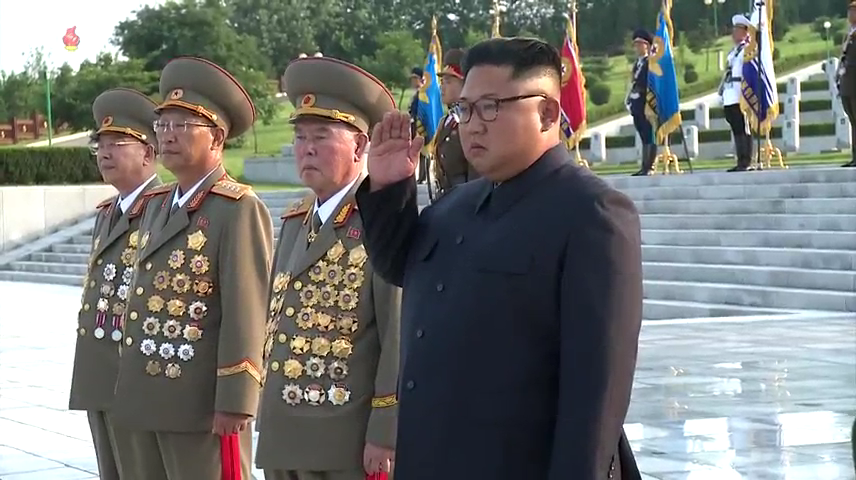
Kim Jong Un salutes a KPA Honor Guard at the Fatherland Liberation War Cemetery in Pyongyang on July 27, 2018. Also in attendance
He said that the “indomitable fighting spirit and the heroic feats of the Fatherland Liberation War martyrs who devotedly defended the Party, the revolution, the county and the people will shine long in the history of the country” and he expressed “the conviction that all the service personnel of the KPA, party members and working people and the new generations would creditably carry forward the history and traditions of sure victory of powerful and dignified socialist Korea.”
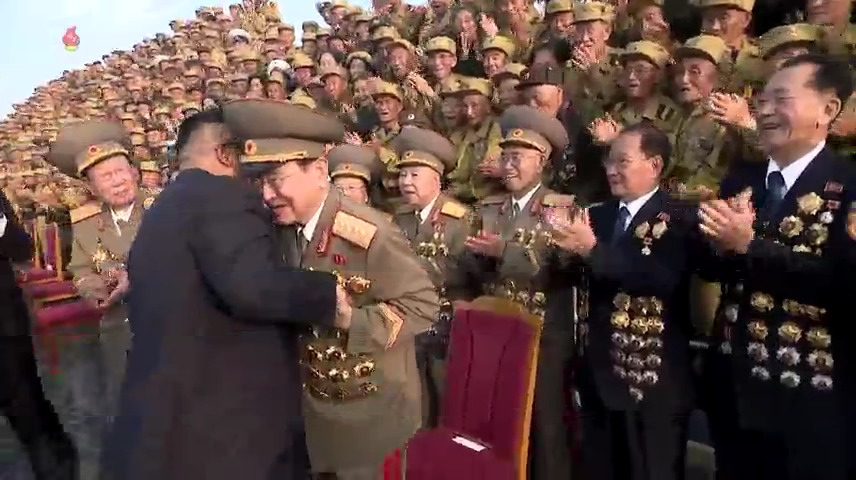
Kim Jong Un hugs and speaks with Gen O Kuk Ryol during a commemorative photo-op with war veterans at the Fatherland Liberation War Cemetery on July 27, 2018. Standing behind them are former Minister of People’s Security Ju Sang Song (right) and former Korean People’s Internal Security Forces Political Director Col. Gen. Ri Pyong Sam (2nd right) (Photo: KCTV)
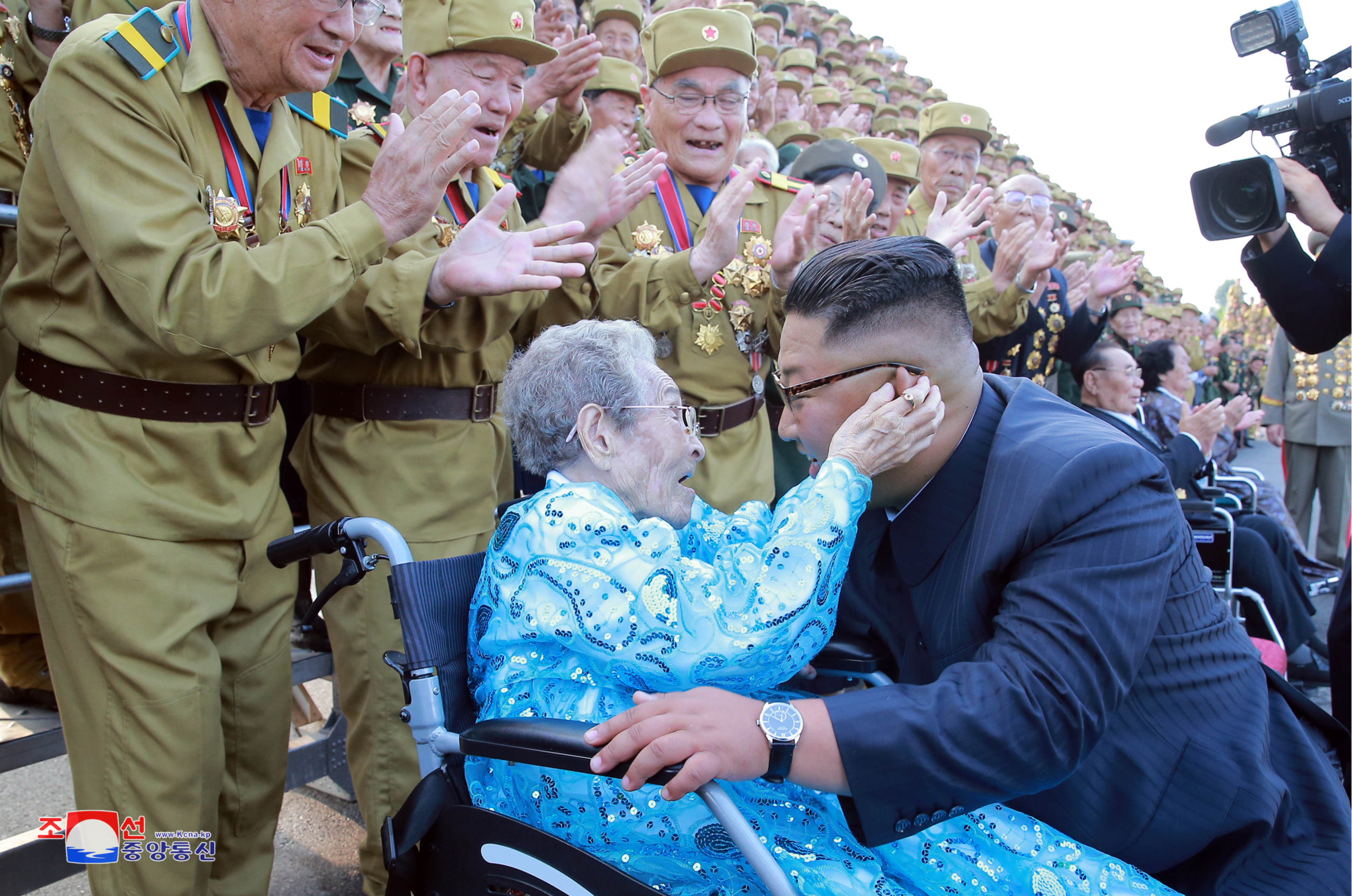
Kim Jong Un greets Hwang Sun Hui, a member of the 88th Sniper Brigade and Honorary Curator of the Museum of the Korean Revolution, on July 27, 2018 (Photo: Rodong Sinmun).
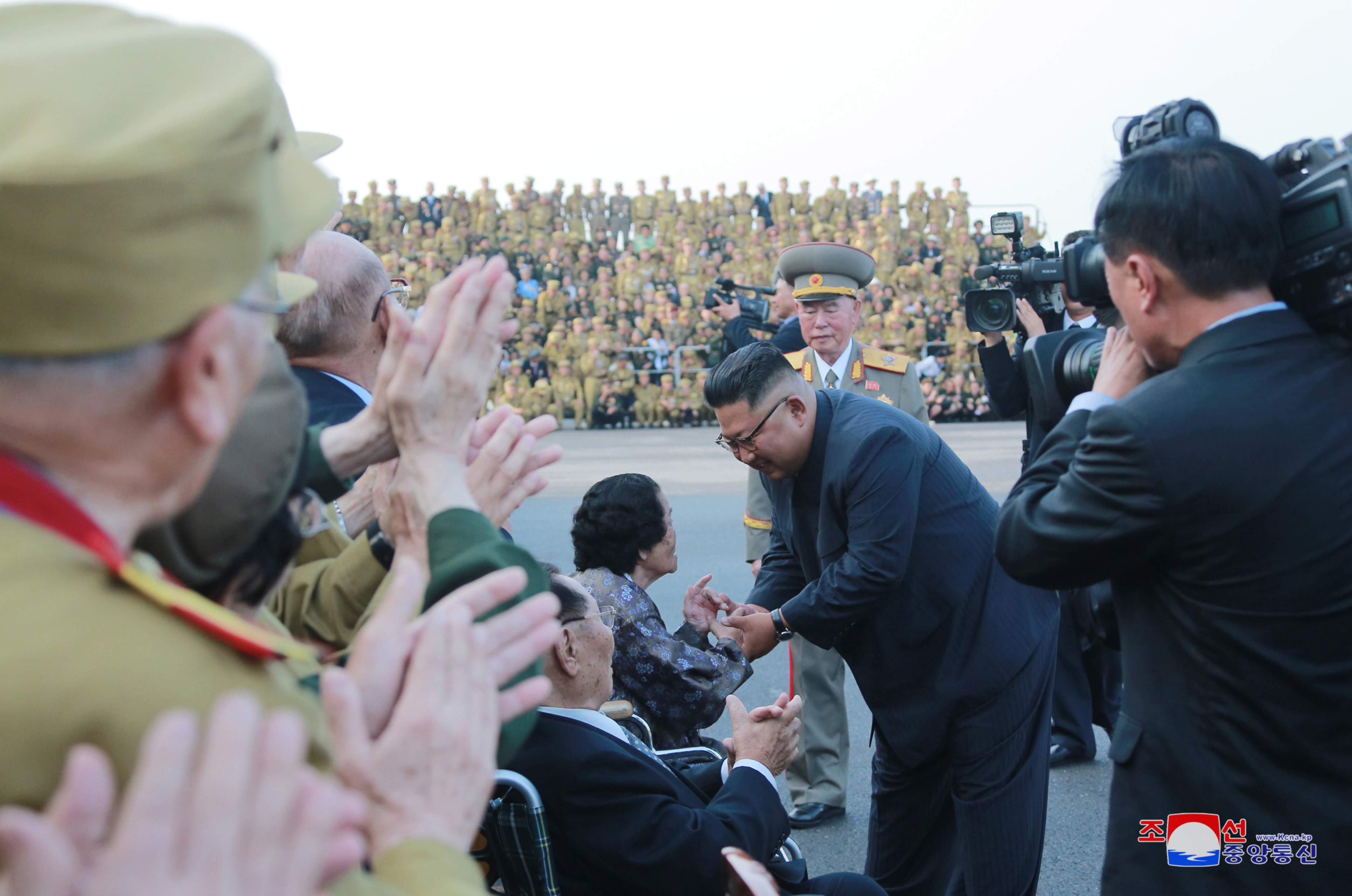
Kim Jong Un greets Ri Yong Suk, a member of the 88th Sniper Brigade (Photo: Rodong Sinmun/KCNA).
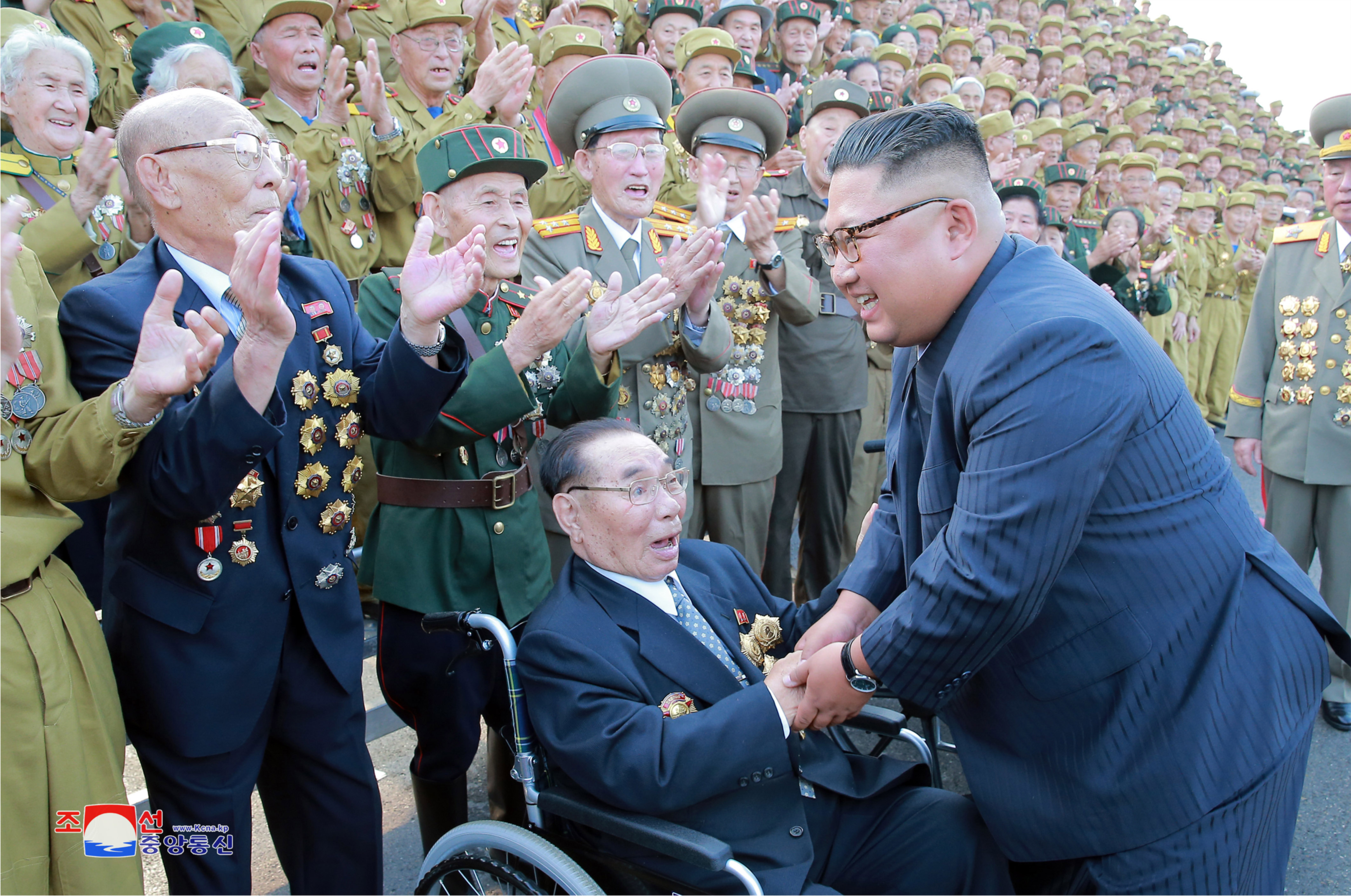
Kim Jong Un shakes hands with Kim Chol Man, former Chairman of the Second Economic Committee and a member of the 88th Sniper Brigade (Photo: Rodong Sinmun).
After the wreath laying, Jong Un met and had a commemorative photo session with participants in the 5th National Conference of War Veterans near the war cemetery. He came out to the venue and “warmly waved back to the war veterans.” He made a “deep bow to all the war veterans” and said that “there were the undying feats of the defenders of the county in the 1950s who bravely fought with the burning loyalty and ardent patriotism for the Party and the country to bring about the victory day of July 27, our Republic is now dynamically advancing toward the high eminence of a powerful socialist country while demonstrating its might as a dignified people’s country.”
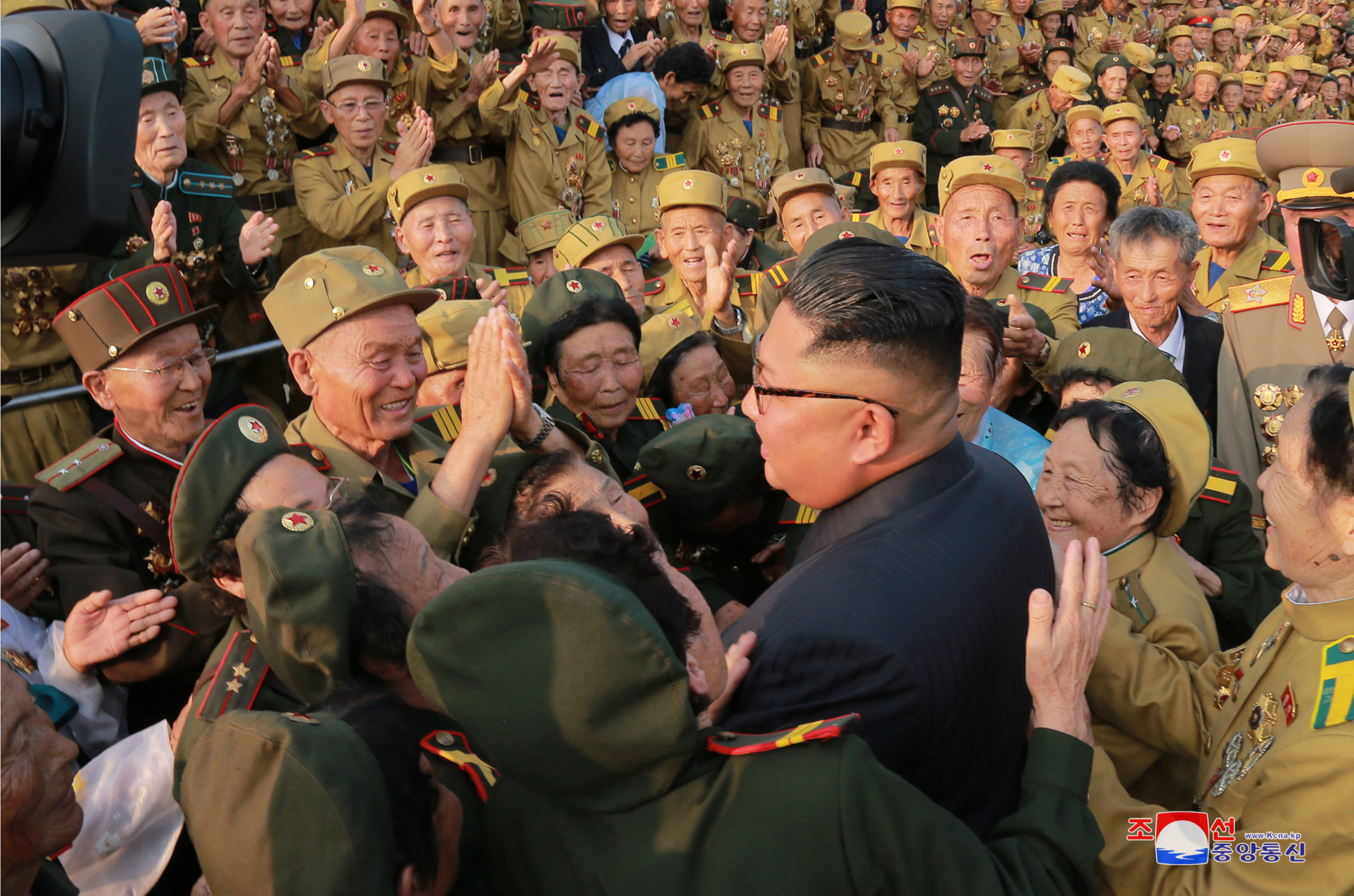
Kim Jong Un greets and embraces war veterans during a commemorative photo-op at the Fatherland Liberation War Cemetery in Pyongyang on July 27, 2018 (Photo: Rodong Sinmun/KCNA).
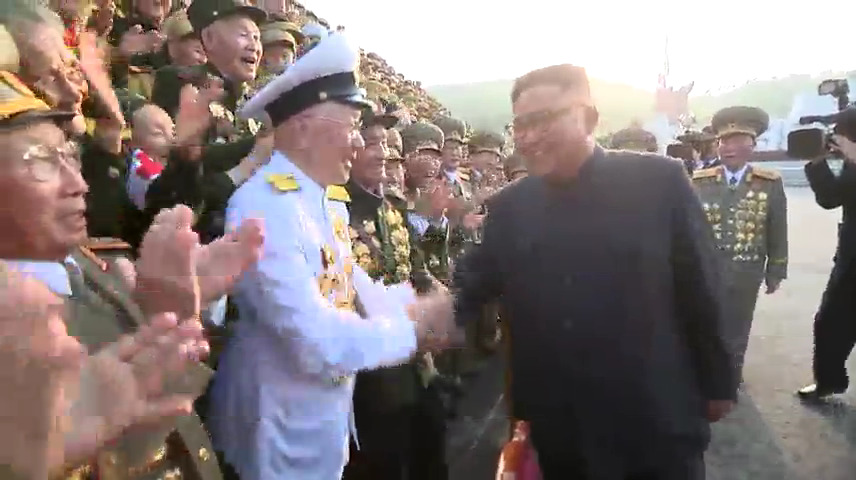
Kim Jong Un shakes hands with a man who appears to be former Minister of the People’s Armed Forces Kim Il Chol (Photo: KCTV).
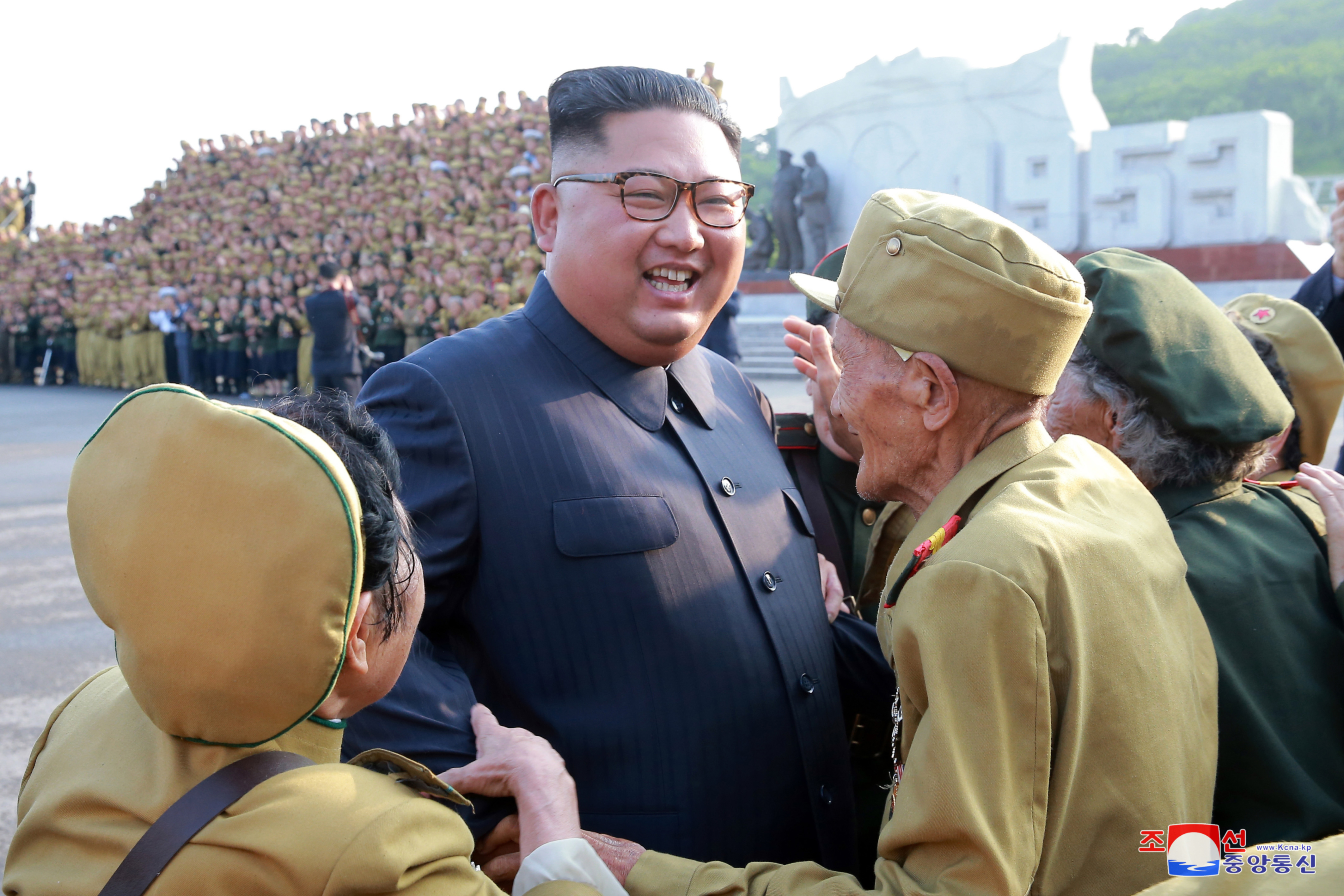
Kim Jong Un smiles and greets elderly war veterans in Pyongyang on July 27, 2018 (Photo: KCNA/Rodong Sinmun).
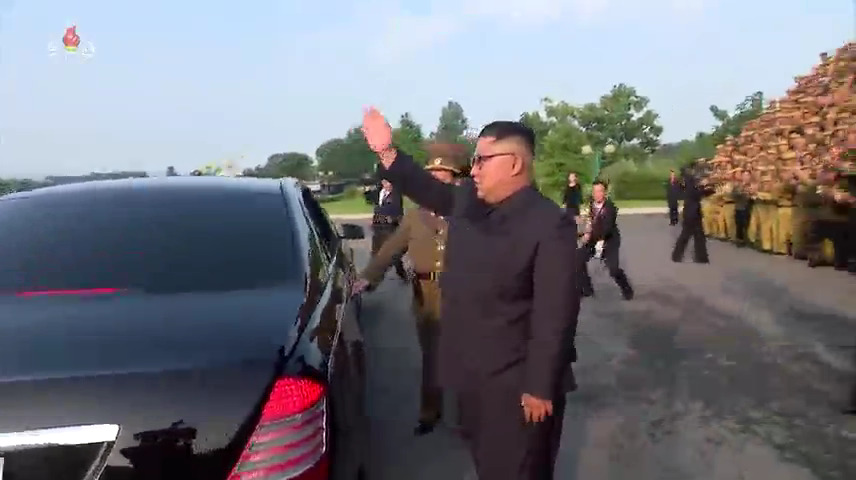
Kim Jong Un waves to war veterans and participants in the 5th conference of war veterans after a commemorative photo session at Fatherland Liberation War Cemetery in Pyongyang on July 27, 2018 (Photo: KCTV).
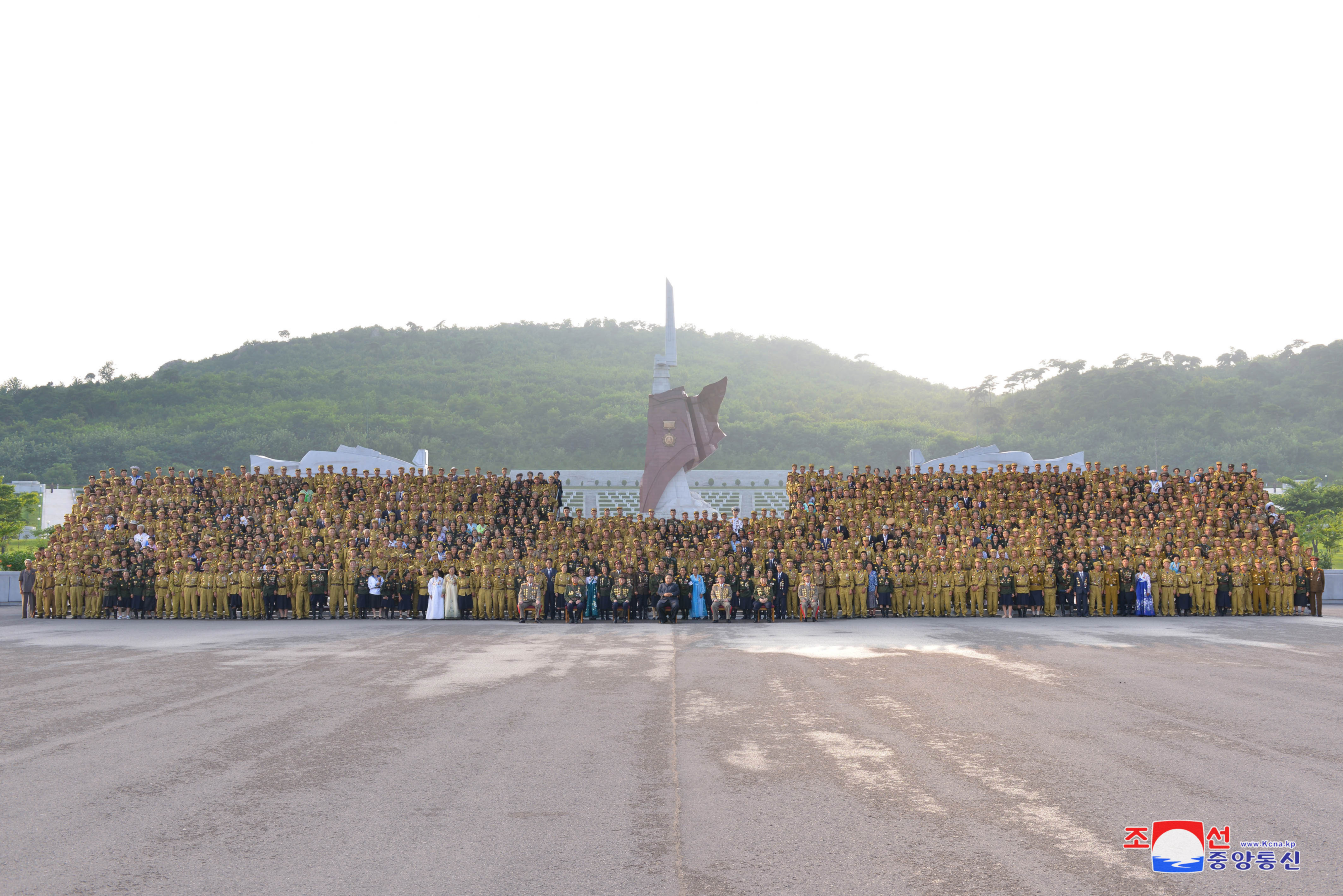
Commemorative photograph of Kim Jong Un and DPRK war veterans in front of the Fatherland Liberation War Cemetery in Pyongyang on July 27, 2018 (Photo: Rodong Sinmun).
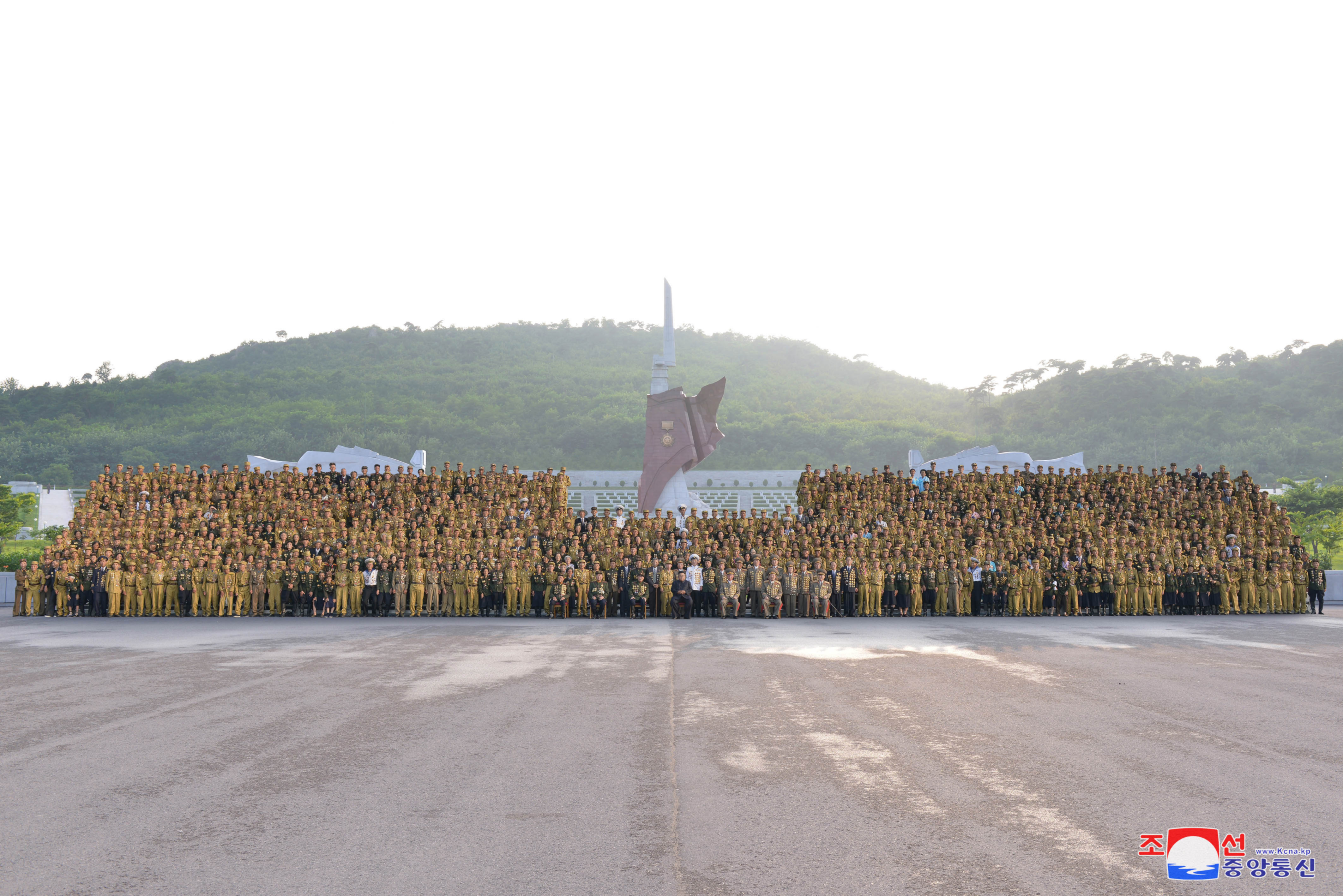
Commemorative photograph of Kim Jong Un with war veterans in Pyongyang on July 27, 2018 (Photo: Rodong Sinmun).
He posed for commemorative photos with the war veterans and voiced his “expectation that the war veterans, benefactors who defended the country at the cost of their blood would remain full of energy despite advanced age and glorify their lives as admirable teachers and educators and instilling the same spirit of defending the country and the revolution as the heroic soldiers of the 1950s had into the hearts of the future generations.”
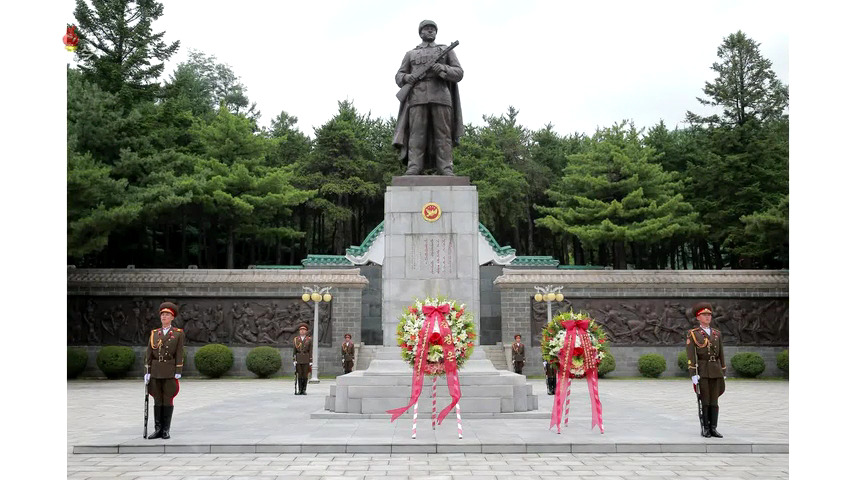
(Photo: KCTV/KCNA)

Kim Jong Un stands in front of monument at the Chinese People’s Volunteers Martyrs’ Cemetery in Hoech’ang, South P’yo’ngan. Also in attendance are Ri Yong Ho, Ri Su Yong, Kim Yong Chol and Gen. No Kwang Chol (Photo: KCTV/KCNA).
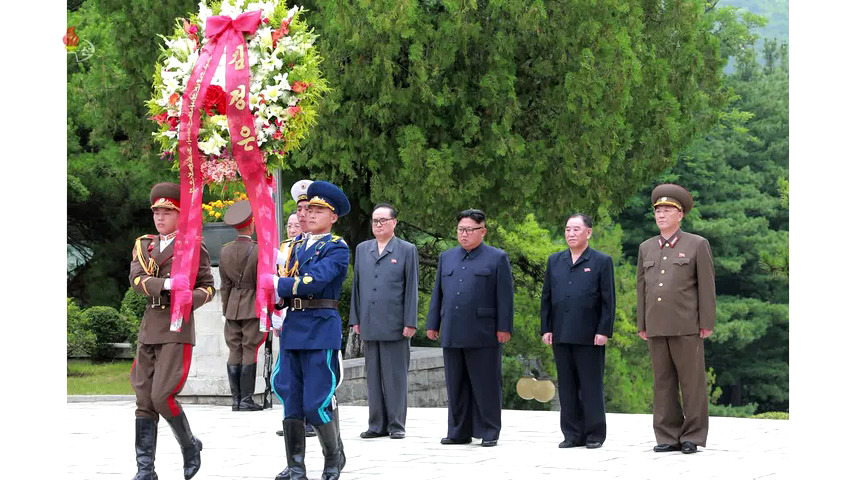
A floral wreath from Kim Jong Un is delivered at the entrance monument to the CPV Martyrs’ Cemetery in Hoech’ang, South P’yo’ngan (Photo: KCTV/KCNA).
Kim Jong Un also visited the Martyrs’ Cemetery of the Chinese People’s Volunteers (CPV) in Hoech’ang, South P’yo’ngan. Attending the wreath-laying ceremony with him were WPK Vice Chairman and WPK International Affairs Department Director Ri Su Yong (Ri Su-yo’ng), WPK Vice Chairman and United Front Department Director Kim Yong Chol (Kim Yo’ng-ch’o’l), Foreign Minister Ri Yong Ho (Ri Yo’ng-ho) and Minister of the People’s Armed Forces Gen. No Kwang Chol (No Kwang-ch’o’l).

Kim Jong Un arranges a ribbon on his floral wreath at the CPV Martyrs’ Cemetery. Standing in the background, right, is Kim Yo Jong (Photo: KCTV/KCNA).
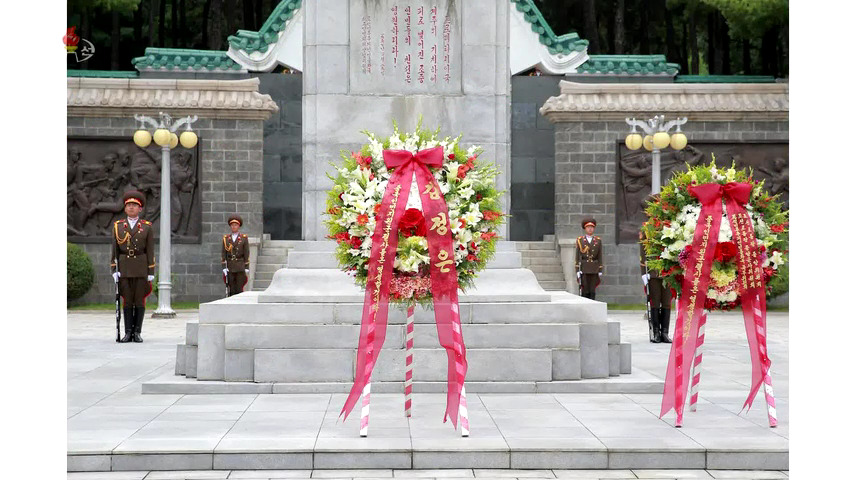
A view of floral wreaths from Kim Jong Un (left) and one sent jointly by the WPK Central Committee, the WPK Central Military Commission and the DPRK State Affairs Commission (right) (Photo: KCTV/KCNA).
He “paid a silent tribute to the martyrs of the CPV in memory of them.” Wreaths from Kim Jong Un and one sent jointly by the WPK Central Committee, the WPK Central Military Commission and the DPRK State Affairs Commission were placed in front of the grave of Mao Anying, son of Chairman Mao Zedong. Jong Un “paid silent tribute to Mao Anying in memory of him.”
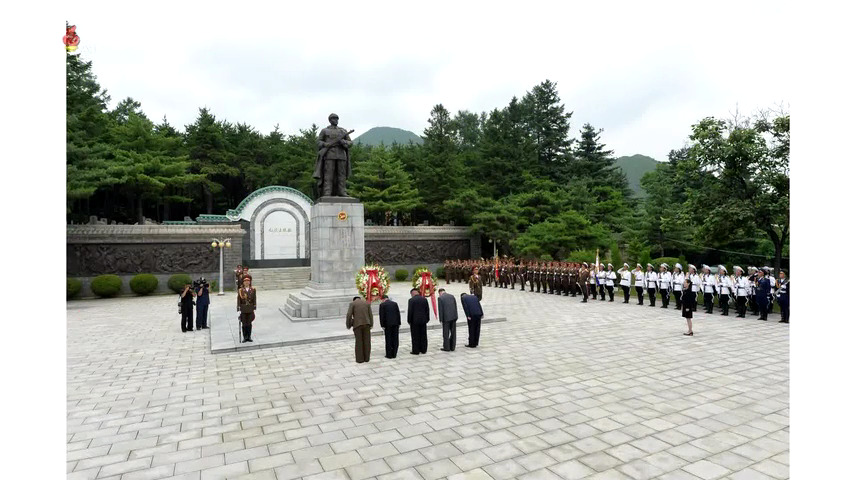
Kim Jong Un and the other visitors pay their respects in front of the monument at the CPV Martyrs’ Cemetery in Hoech’ang (Photo: KCTV/KCNA).
Kim Jong Un and the visitors walked around the cemetery and looked at the graves of the CPV martyrs. He said “with deep emotion” that “during the Fatherland Liberation War, the party, government and people of China dispatched their fine sons and daughters to the Korean front without hesitation despite many difficulties in the early period of building a country to help the Korean people in their cause of justice at the cost of blood and made an immortal contribution to the victory in the war.”
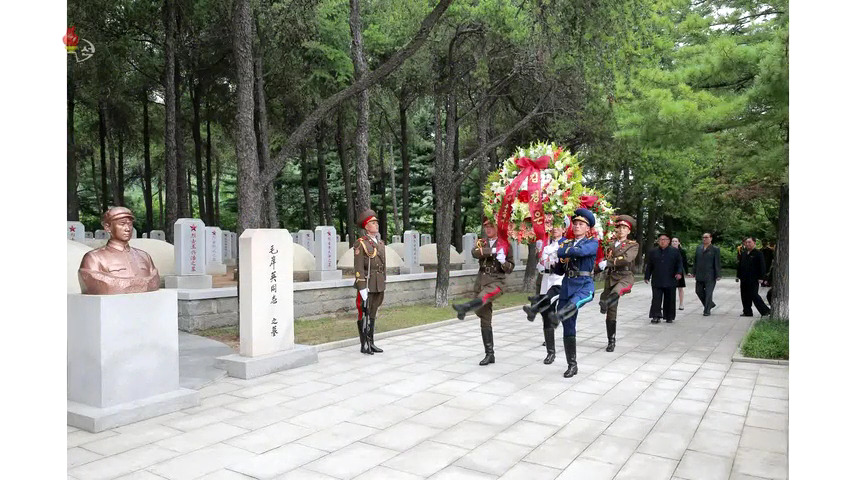
A floral wreath from Kim Jong Un is delivered to the grave of Mao Anying, who was killed in action during the Korean War, the son of Chairman Mao Zedong (Photo: KCTV/KCNA).
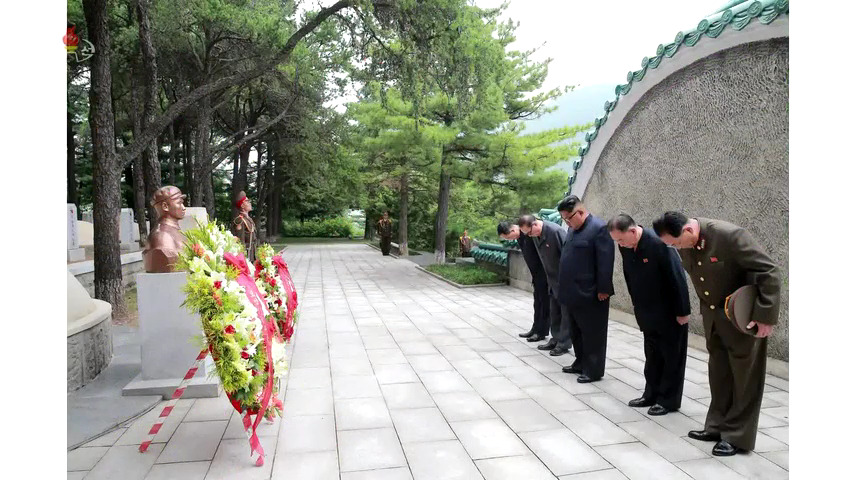
Kim Jong Un and the other senior DPRK officials visiting with him pay their respects at the grave of May Anying at the CPV Martyrs’ Cemetery in Hoech’ang (Photo: KCTV/KCNA).
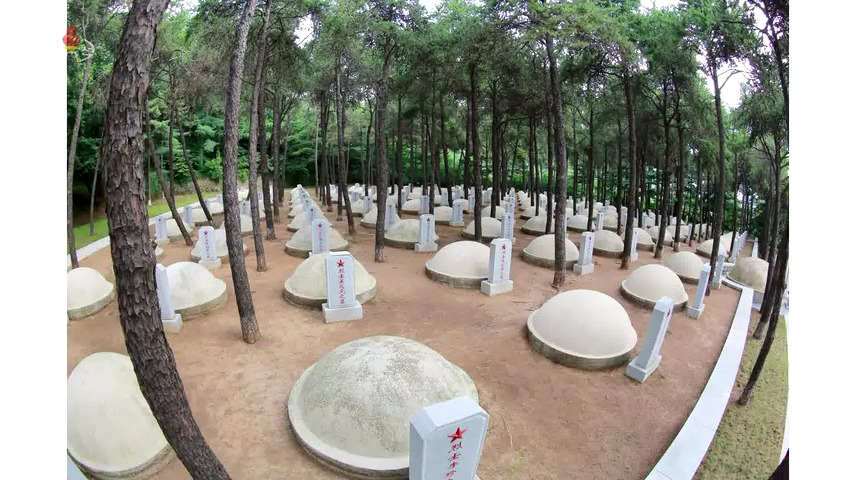
View of grave markers at the CPV Martyrs’ Cemetery in Hoech’ang, South P’yo’ngan (Photo: KCTV/KCNA).
He said that “the blood of the Chinese comrade permeated the mountains and streams, trees and plants, on this land and the soul of the Korean revolutionaries settled on the vast land of China. The DPRK-China relations are developing into special and durable friendly relations unprecedented in history as they were forged in firm militant friendship and genuine trust deepened at the cost of blood and life, not merely for the reason that the two countries are geographically close with each other.”
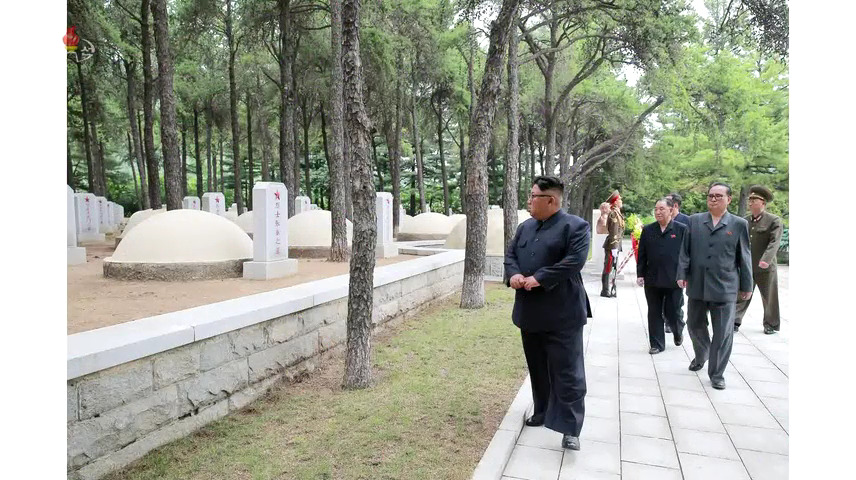
Kim Jong Un looking around at the grave markers and memorials at the CPV Martyrs’ Cemetery (Photo: KCTV/KCNA).
Jong Un noted that “the feats the Chinese comrade performed by defending the just cause at the risk of their lives and achieving peace at the cost of their blood when the Korean people faced the hardest, dead-or-alive situation will always remain in the hearts of the Korean people.” He said that the “Korean people would as ever take pride in having the creditable fraternal country and the great friend like the People’s Republic of China.”
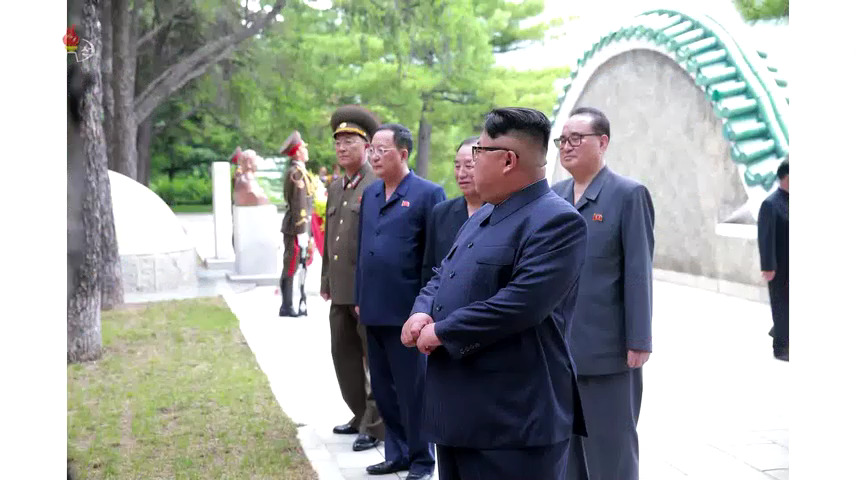
Kim Jong Un visiting the CPV Martyrs’ Cemetery. Also in attendance (L-R) are: Minister of the People’s Armed Forces Gen No Kwang Chol, DPRK Foreign Minister Ri Yong Ho, WPK Vice Chairman and United Front Department Director Kim Yong Chol and WPK Vice Chairman and International Affairs Department Director Ri Su Yong (Photo: KCTV/KCNA)
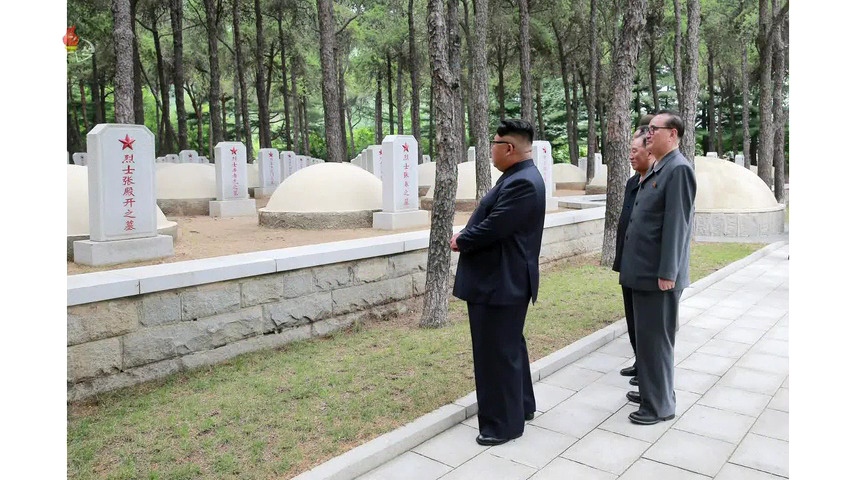
Kim Jong Un looking around the CPV Martyrs’ Cemetery in Hoech’ang, South P’yo’ngan. At the right is Ri Su Yong (Photo: KCTV/KCNA).
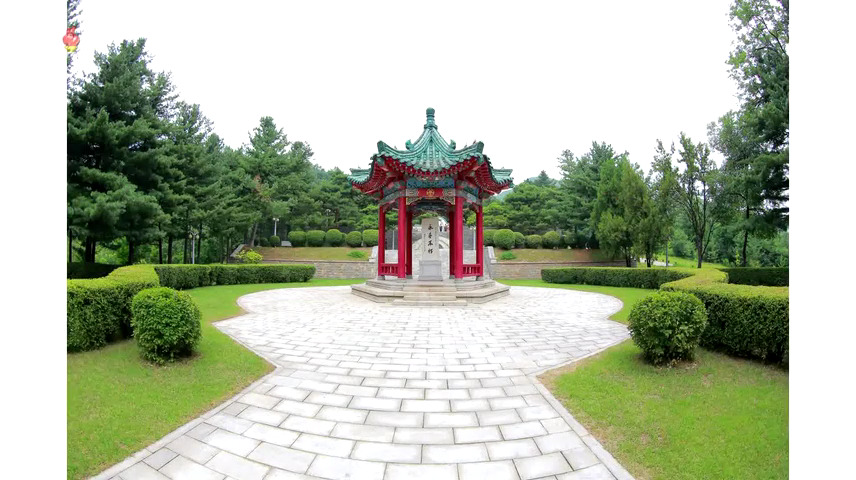
Memorial shrine at the Chinese People’s Volunteers’ Martyrs’ Cemetery in Hoech’ang, South P’yo’ngan (Photo: KCTV/KCNA).
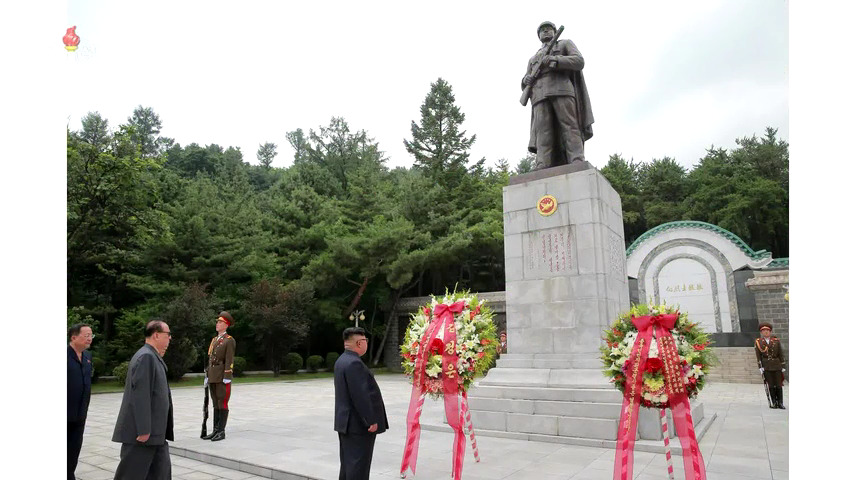
Kim Jong Un inspecting the memorial and his floral wreath prior to departing from the CPV Martyrs’ Cemetery (Photo: KCTV/KCNA)
He said that “it is the due responsibility, moral sense of obligation and noble mission of the Korean people to add eternal luster to the exploits performed by the service personnel of the Chinese People’s Volunteers who found themselves on the Korean front and displayed loyal matchless bravery and self-sacrificing spirit.” Kim Jong Un “underlined the need to spruce up and keep better the cemeteries of the martyrs of the CPV across the country in a sincere manner as their own flesh and blood would do.”